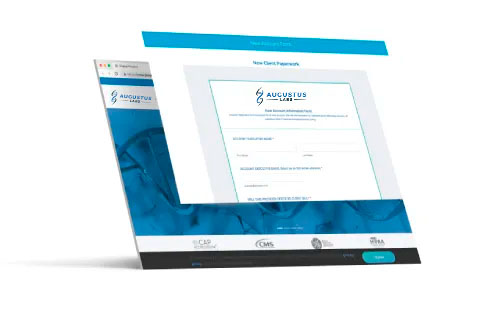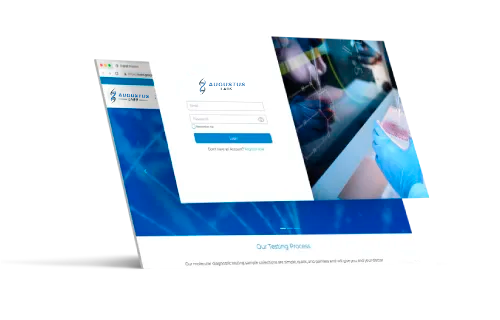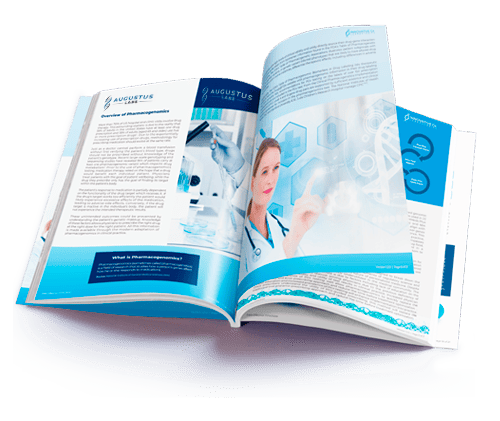Pharmacogenetic (PGx) testing serves as a valuable tool to reveal individual drug responses, guiding optimal medication selection and dosage. This approach aims to enhance efficacy, minimize side effects, and mitigate the need for trial and error in prescribing.
Right
drug
Right
dose
Right
Patient
Optimal
Medication
Regimen
HOW TO ORDER YOUR
TESTING KIT
1
Your healthcare provider will order a pharmacogenetic (PGx) test for you if it is deemed appropriate.
2
Once you receive your collection kit, you will collect your DNA sample via a buccal (cheek) swab, extracted gDNA sources, or a whole blood sample.
3
You will send the DNA sample to Augustus Laboratories for analysis.
4
The lab analyzes the data and generates a comprehensive report for your healthcare provider.
5
Your healthcare provider will review the test results with you during a post-PGx consultation to develop a personalized treatment strategy tailored to your genetic profile.
How we made Pharmacogenetic Testing Easy
Our report simplifies medication choices with 5 clear
classifications to guide clinicians:

“Normal Response Expected”
No genetic variants or metabolic interactions were identified among the analyzed genes, indicating a normal expected response to medications in this category, without the need for increased caution or dose adjustments.”

“Use With Caution”
Indicates that one or more genetic variants or metabolic interactions have been identified, suggesting a need for increased caution, dose adjustment, or consideration of alternative medications.

“Consider Alternatives”
Refers to gene-drug pairs where interactions between a drug and one or several genes may lead to mild adverse drug reactions or reduced efficacy.

"Drug management"
Refers to gene-drug pairs where there is a risk of negative drug responses such as adverse reactions or reduced efficacy. These outcomes can potentially be prevented by adjusting the medication according to the patient’s individual pharmacogenomic results and other relevant non-genetic factors.
CASE STUDIES
In a notable study published in JAMA Oncology, researchers conducted pharmacogenetic testing on 92 patients undergoing treatment for advanced cancer with the chemotherapy drug irinotecan. The study revealed that patients carrying a specific genetic variant were at a significantly higher risk of developing severe side effects. Armed with this genetic insight, clinicians were able to tailor treatment strategies by either adjusting the drug dosage or opting for alternative medications [1].

In a case study featured in the Journal of Clinical Psychiatry, a patient diagnosed with major depressive disorder, and who had previously shown inadequate response to several antidepressant medications, underwent pharmacogenetic testing. The results indicated that the patient carried a genetic variant associated with impaired metabolism of specific antidepressants. Armed with this genetic insight, clinicians adjusted the patient’s medication regimen, resulting in improved symptom management and treatment response [2].
In a notable study involving the Vanderbilt Pharmacogenomic Resource for Enhanced Decisions in Care and Treatment program, researchers performed pharmacogenetic testing on a cohort of more than 10,000 patients. This initiative aimed to pinpoint individuals who were at heightened risk of experiencing adverse drug reactions or who exhibited reduced likelihood of responding to specific medications. By leveraging these genetic insights, clinicians were empowered to tailor treatment strategies more precisely, thereby enhancing patient care and outcomes [3].
References
[1] Innocenti F, Owzar K, Cox N, et al. A Genotype-Directed Dosing Study of Irinotecan in Patients With Advanced Cancer. JAMA Oncol. 2017;3(12):170078. doi:10.1001/jamaoncol.2017.0078.[2] Winner JG, Carhart JM, Altar CA, Goldfarb S. A pilot study examining the effects of genotype-guided dosing of duloxetine on pain control in patients undergoing total knee arthroplasty. J Pain Res. 2015;8:363-372. doi:10.2147/JPR.S87268
[3] Van Driest SL, Shi Y, Bowton EA, et al. Clinically actionable genotypes among 10,000 patients with preemptive pharmacogenomic testing. Clin Pharmacol Ther. 2014;95(4):423-431. doi:10.1038/clpt.2013.213
AGPGXS+
67 Genes
664
Variants
294 Medications
NGS + QPCR
AGPGx+Interactions: Drug to Drug/Gene/Food/Alcohol/ & Lab.
Post PGx Test Clinical Consults 24/7 Support.
AGPGx+ Portal - Live Reporting.
High Evidence Based Genes.
Ongoing Database Pipeline Updates.
CYP2D6 - Not Default to *1 Allele.
AGPGx+ Organ Impact Consideration: Liver and Kidney Function.
AGPGx+ HealthTech - Results in 7-10 days.
Every year, adverse drug events (ADEs) are responsible for:
Pharmacogenomic Testing in Polypharmacy Patients in a Long-Term Care Setting Benefits and Outcomes:
ER visits
1M
Hospital Admissions
2.2M
Office
visits
5M
Healthcare
costs
$136B
Pharmacogenomic (PGx) testing in polypharmacy patients within a long-term care (LTC) setting has demonstrated significant benefits, including optimized medication regimens and substantial cost savings. This personalized approach to medication management is particularly crucial for LTC patients, who often take multiple medications, increasing the risk of adverse drug reactions and interactions.
Key Findings:
1
Drug Modifications:
– Personalized Medication Adjustments: PGx testing allows for the identification of genetic variants that affect drug metabolism and response. In LTC settings, this information is used to tailor medication regimens, ensuring that each patient receives the most effective drugs with the least risk of side effects.
– Reduction in Adverse Drug Events (ADEs): By understanding how patients metabolize and respond to medications, healthcare providers can avoid prescribing drugs that are likely to cause ADEs, thereby improving patient safety and treatment outcomes.
2
Cost Savings:
– Decreased Hospitalizations: Fewer adverse drug events lead to a reduction in hospitalizations and emergency room visits, which are significant cost drivers in healthcare.
– Optimized Drug Use: By eliminating ineffective or harmful medications and replacing them with more appropriate alternatives, the overall cost of medication is reduced. This targeted approach minimizes waste and ensures that resources are used more efficiently.
CASE STUDY EXAMPLE:
In a study involving polypharmacy patients in a long-term care setting, PGx testing led to substantial drug modifications and cost savings:
– Population: The study included a diverse group of LTC patients, each taking multiple medications.
– Methodology: PGx testing was conducted to identify genetic variants impacting drug metabolism and efficacy.
– Results:
– Drug Adjustments: A significant number of patients had their medication regimens altered based on PGx test results, leading to improved therapeutic outcomes.
– Cost Analysis: The study reported an average cost savings per patient due to reduced ADEs, fewer hospitalizations, and more efficient medication use.
Conclusion:
50%
$621
~1-3
Of patients has drug modifications
Cost savings per patient annually
Drugs were stopped or replaced
• $1,553 & 1,863
Cost savings over a 2.5 - 3% year time frame

1. NEW CLIENTS ACCOUNT REGISTER
2. Client AGPGx+ Login Access


3. CLIENT RECEIVES AGPGx+ Results

Looking for Personalized Guidance on Your AGPGx+ Test Results?
We’ve got you covered! Our Chief Medical Consultant is available for 24/7 consultation to help you navigate your results and answer any questions you may have. With our expert guidance, you can gain deeper insights into how your genetic makeup affects medication metabolism, enabling you to make informed decisions about your healthcare. Pharmacogenomic testing can significantly enhance the efficacy of treatments by tailoring medication choices to your unique genetic profile, thereby minimizing adverse drug reactions and improving overall treatment outcomes.
Contact us today to learn more about our AGPGx+ test and our comprehensive consultation services!
You May Benefit from PGx Testing If:
FDA Recommendations: The FDA recommends or requires PGx testing before taking a new medication your doctor may prescribe.
Multiple Medications: You are on multiple medications (polypharmacy), which can increase the risk of drug interactions.
Ineffective Treatments: You have tried multiple medications or dosages without finding one that works well for you.
History of Side Effects: You have a personal or family history of serious side effects from medications.
Dose Adjustments Needed: You may require a higher or lower than usual dose of certain medications due to your genetic makeup.
Diet and Supplements Interactions: Your medication’s effectiveness changes when you eat certain foods (like spinach), take certain supplements (such as St. John’s Wort), or drink certain juices (like grapefruit juice).
Medication Interference: Your medication has stopped working as usual after your healthcare provider prescribed an additional medication.
Pharmacogenomic testing can provide valuable insights into your unique genetic profile, helping your healthcare provider tailor treatments to your specific needs, thereby maximizing efficacy and minimizing adverse effects.
Medication Management Beyond Genetic Testing
Comprehensive Coverage:
– 22 Therapeutic Areas: Our services cover a wide range of therapeutic areas to ensure comprehensive medication management.
– 294 Medications: We provide detailed insights and management for 294 different medications, ensuring tailored and effective treatment plans.
Pharmacogenomic testing is just the beginning. Our medication management services extend beyond genetic testing to provide you with a holistic approach to your healthcare, addressing all aspects of your medication needs.
Anesthesiology
Cardiology
Dental
Dermatology
Endocrinology
Gastroenterology
Gynecology
Hematology
Immunology
Infectious Diseases
Neurology
Oncology
Ophthalmology Othorhinolaryngology
Pain Management
Psychiatry
Respiratory
Rheumatology
Smoking
Cessation
Supplements
Toxicology
Urology
GET YOUR WHITE PAPER
Pharmacogenomics: A Tool Driving Precision Medicine

